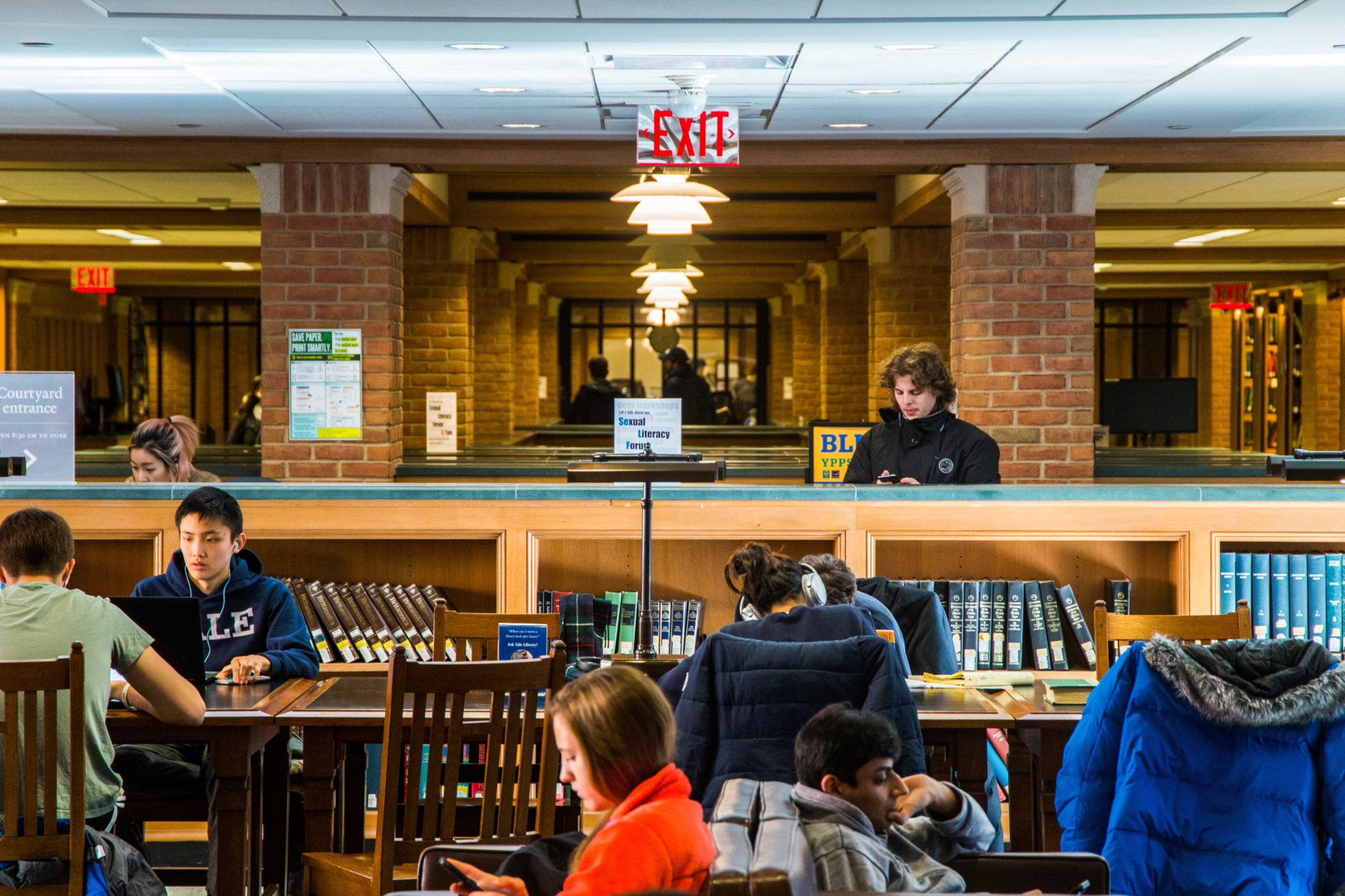
Amid strong pushback from impassioned students and faculty, University Librarian Susan Gibbons announced several changes to the Bass Library renovation plans on Thursday evening.
The original plan included closing the library after Commencement this year until January 2020 to add 105 new study spaces and relocate 110,000 of Bass’s current 150,000 books to the Sterling Memorial Library stacks. In response to the proposal’s announcement on Jan. 23, staff columnist Leland Stange ’19 and English professor Leslie Brisman penned opinion articles for the News opposing the plan. Stange also organized a Facebook event — which currently has 954 people listed as “going” — encouraging students to check out books from Bass to elevate circulation numbers. He also circulated a petition online starting Tuesday to “Save Bass Library!” that, so far, has garnered 600 signatures.
According to the Thursday email from Gibbons sent to the Yale community, the project architects modified the renovation plans in response to the recent backlash. The changes include modifying the construction timeline to allow for a “soft opening” at the beginning of the fall semester, reducing the book collection by just 89,000 books to 61,000 and adding 84 new study spaces instead of 105, the email said.
“The trade-off for these changes is a smaller increase in study spaces than we initially envisioned,” Gibbons wrote in the email. “As you know, the reason for this project is to make sure our growing undergraduate population will continue to find ample, good study space in Bass. Although the increased study space is smaller now, I believe it will still make a significant difference for students.”
The new plan will allow Bass to open on Aug. 28 for students to study and work. However, library staffing, services, collections and furnishings “will still be in flux” until Bass’s official re-opening on Oct. 1. The library will retain more of its current furniture than previously planned, which will allow for the construction period to be shortened.
The renovations will focus on making Bass a “gateway” to the full Yale library collection by renewing the library’s collection, expanding the study space and moving two librarians’ offices to the top floor to give them more visibility, Gibbons’ email said.
Gibbons told the News that she “personally appreciate[s]” the widespread student feedback and the deep care for the library that many students have shown this week. She said that projects like the renovation are “highly iterative,” and plans that are often incomplete must be shared early enough in the process to allow for modifications based on community feedback. She added that library administration knew that there would be many questions about the plan following the Jan. 23 presentation, but it was not aware “how concerned students would be about the possibility of Bass shutting down for a semester.”
“The Yale Daily News article, and the feedback forms filled out by many students were critical in shaping our direction to the architects this week, and at the same time, they were gathering the additional information we needed to move away from our earlier, conservative estimates of construction time in favor of the idea of a soft opening that will at least give students access to the space, if not all the services and amenities, at the beginning of the semester,” Gibbons wrote in an email to the News.
Stange told the News that he is “very happy that Susan Gibbons recognized the catastrophe that there would be if Bass closed next semester.” He added that he was “incredibly proud” of the work students have done by checking books out of Bass this past week, “proving that students do care about books against what library administrators thought and against what everyone expected of us.”
Stange added that there is “still work to do” in re-evaluating the role of libraries at universities, but the “Save Bass” movement has been a “fantastic start” for this.
Still, some remain unhappy with the state of the project and the library’s approach to it.
Brisman called the changes to the plan “happy news, if indeed it is news and not a cover for essentially unchanged plans with a shinier face.”
“The revised collection size of 58 percent of the current 150,000 volumes is exactly what we were told two years ago, so I must regard the dip to 40,000 and the ‘concession’ raising the number (to 57,000 or 61,000) as an example of clever marketing and manipulation of dissent,” Brisman wrote in an email to the News.
Brisman added that he still does not understand why it is necessary to renovate the library. While he said he believes that Bass’s collection “does indeed need to be culled and updated,” that requires only “a dedicated librarian, not construction.”
English professor Jill Campbell GRD ’88 — who has publicly spoken out against the plans — criticized the library administration for not addressing student, faculty and staff concerns that were previously voiced in small meetings, at public forums and in correspondence in the two years since the renovation plan was first introduced.
“Why does it take public outcry and protest to have an impact at Yale on decisions imposed from above?” Campbell wrote in an email to the News. “This is a very damaging method for decision-making that Yale leadership has repeatedly fallen into in recent years — it damages trust and relationships within the university community, as well as creating inefficiencies and the confusion of last-minute, reactive changes of course.”
Campbell added that she believes that the library’s leadership has “yet to show its commitment to the educational mission and functions of a university library,” and she looks forward to “seeing a renewed commitment” from the staff to helping Yale students access the library system’s full breadth of resources.
Bass Library is located at 110 Wall Street.
Asha Prihar | asha.prihar@yale.edu







